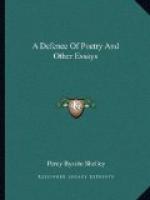A poet, as he is the author to others of the highest wisdom, pleasure, virtue and glory, so he ought personally to be the happiest, the best, the wisest, and the most illustrious of men. As to his glory, let time be challenged to declare whether the fame of any other institutor of human life be comparable to that of a poet. That he is the wisest, the happiest, and the best, inasmuch as he is a poet, is equally incontrovertible: the greatest poets have been men of the most spotless virtue, of the most consummate prudence, and, if we would look into the interior of their lives, the most fortunate of men: and the exceptions, as they regard those who possessed the poetic faculty in a high yet inferior degree, will be found on consideration to confine rather than destroy the rule. Let us for a moment stoop to the arbitration of popular breath, and usurping and uniting in our own persons the incompatible characters of accuser, witness, judge, and executioner, let us decide without trial, testimony, or form, that certain motives of those who are ‘there sitting where we dare not soar’, are reprehensible. Let us assume that Homer was a drunkard, that Virgil was a flatterer, that Horace was a coward, that Tasso a madman, that Lord Bacon was a peculator, that Raphael was a libertine, that Spenser was a poet laureate. It is inconsistent with this division of our subject to cite living poets, but posterity has done ample justice to the great names now referred to. Their errors have been weighed and found to have been dust in the balance; if their sins ’were as scarlet, they are now white as snow’; they have been washed in the blood of the mediator and redeemer, Time. Observe in what a ludicrous chaos the imputation of real or fictitious crime have been confused in the contemporary calumnies against poetry and poets; consider how little is, as it appears—or appears, as it is; look to your own motives, and judge not, lest ye be judged.
Poetry, as has been said, differs in this respect from logic, that it is not subject to the control of the active powers of the mind, and that its birth and recurrence have no necessary connexion with the consciousness or will. It is presumptuous to determine that these are the necessary conditions of all mental causation, when mental effects are experienced unsusceptible of being referred to them. The frequent recurrence of the poetical power, it is obvious to suppose, may produce in the mind a habit of order and harmony correlative with its own nature and its effects upon other minds. But in the intervals of inspiration, and they may be frequent without being durable, a poet becomes a man, and is abandoned to the sudden reflux of the influences under which others habitually live. But as he is more delicately organized than other men, and sensible to pain and pleasure, both his own and that of others, in a degree unknown to them, he will avoid the one and pursue the other with an ardour proportioned to this difference. And he renders himself obnoxious to calumny, when he neglects to observe the circumstances under which these objects of universal pursuit and flight have disguised themselves in one another’s garments.




